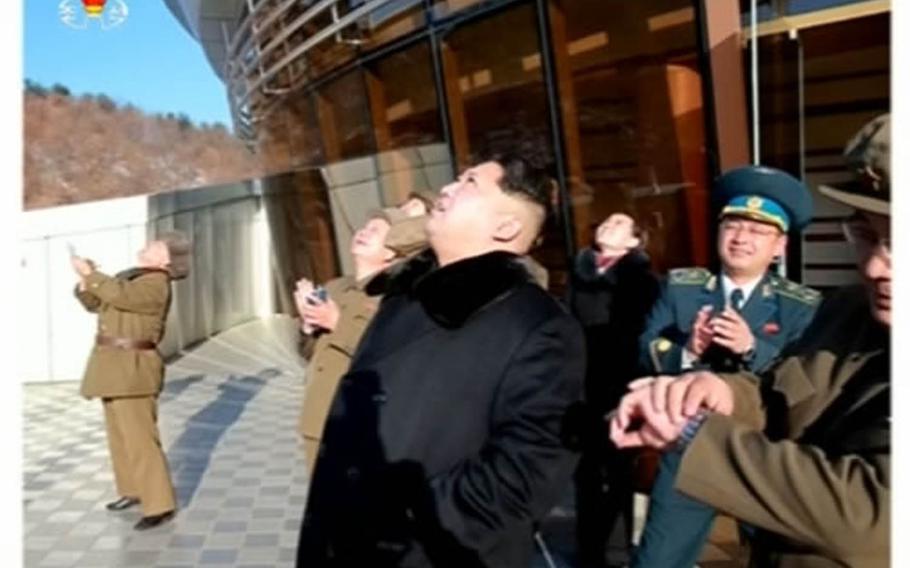
This screenshot from a Korean Central Television broadcast purports to show North Korean leader Kim Jong Un and other officials watching a missile launch, Sunday, Feb. 7, 2016. (Screenshot from KCTV)
SEOUL, South Korea — North Korea tried but failed to launch a missile Friday, officials said, on the 104th birthday of its founder Kim Il Sung.
The effort comes amid escalating tensions with the international community over the North’s nuclear program. The U.S., as well as Pyongyang’s longtime ally China, condemned Friday’s failed launch.
“[The launch attempt] was detected and tracked by the U.S. Strategic Command systems,” said a U.S. official speaking on condition of anonymity. “We assess that the launch failed.”
The South Korean Joint Chiefs of Staff said a medium-range ballistic missile was launched from the North’s east coast early in the day, “but the launch seems to have ended in failure,” according to South Korea’s Yonhap news agency.
Yonhap said it was a Musudan ballistic missile, which has a range of more than 1,800 miles and was detected in the area earlier this week, but the report did not cite a source and could not immediately be confirmed.
There has been recent speculation in South Korea that its rival was preparing to test a medium-range missile that would be capable of reaching U.S. military installations in Japan and Guam. South Korea raised concern about a possible launch on Thursday when it said it had spotted a mobile launcher carrying one or two Musudan ballistic missiles near the eastern North Korean city of Wonsan.
The U.S., which has 28,000 troops stationed in South Korea, said Strategic Command systems detected what was assessed to be a failed North Korean missile launch. The North American Aerospace Defense Command said it did not pose a threat to North America.
A South Korean defense ministry official also said North Korea tried to launch a missile early Friday and it appeared to have failed. He said he could not confirm the missile type.
The United States said the North’s efforts are violations of the U.N. sanctions and raise tensions on the Korean peninsula.
“We continue to call on North Korea to abandon its nuclear weapons program and to return to the negotiating table,” said a U.S. Embassy official in Seoul.
Pyongyang has staged a series of what the U.S. and South Korea consider provocations this year, starting with a fourth nuclear test in January and a long-range rocket launch the following month. North Korean leader Kim Jong Un also said his scientists have developed nuclear warheads small enough to fit on ballistic missiles.
The bellicose rhetoric and weapons tests have continued despite a fresh round of U.N. sanctions imposed on the isolated country in March. China, which signed onto the sanctions, called the failed launch “the latest in a string of saber-rattling that, if unchecked, will lead the country to nowhere,” the official Xinhua news agency said in an English commentary.
Jeffrey Lewis, director of the East Asia program at the James Martin Center for Nonproliferation Studies in California, cautioned against gloating over the launch’s failure.
“It’s moderately good news,” he said. “But they’re still trying and even if your rocket blows up you learn things.”
North Korea had widely been expected to stage a missile launch in the run-up to a ruling Workers’ Party Congress in May, its first in nearly four decades. The founding leader’s birthday, which is celebrated with pomp and circumstance in the isolated country, was seen as an opportunity for that.
The North Koreans also have expressed anger over annual South Korean-U.S. military drills, new U.N. sanctions over its nuclear program and the recent defection of several North Koreans to the South, including a colonel belonging to the North’s spy agency.
Yang Mu-jin, a professor at the University of North Korean Studies in Seoul, said Pyongyang has a two-pronged goal.
“Internally they would like to show their country is a nuclear power,” he said. “Externally they would like to show to the U.S. that they will keep their nuclear ability … and they would like to show the U.S. policy toward North Korea has failed.”
Stars and Stripes staffers Tara Copp and Yoo Kyong Chang contributed to this report.
gamel.kim@stripes.com Twitter: @kimgamel